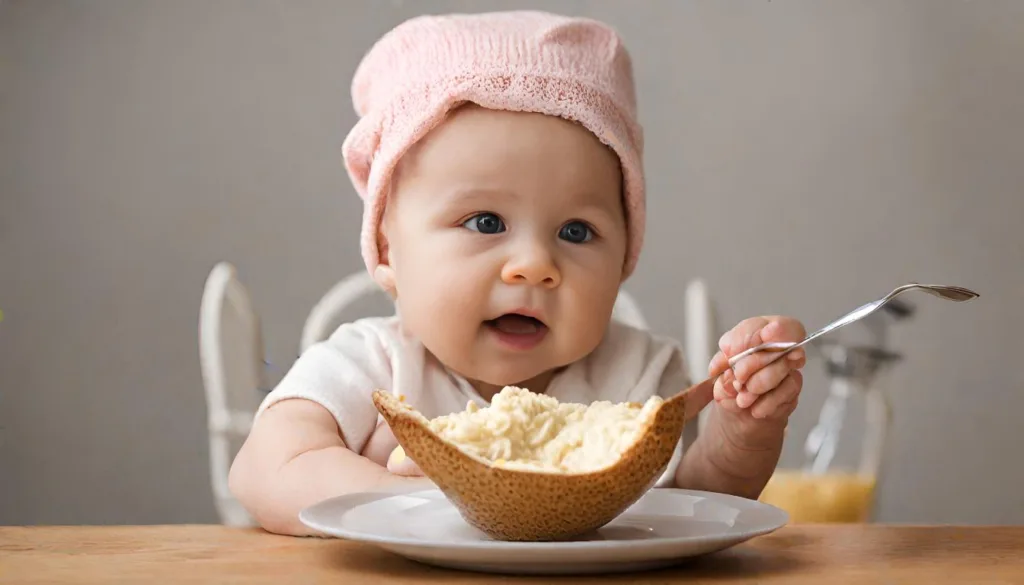25 Foods You Should Never Feed Your Baby

Introduction:
Your baby’s introduction to solid foods is an exciting and crucial developmental stage. To protect their safety and wellbeing, nevertheless, it entails making deft and knowledgeable decisions. A developing baby needs a varied diet, but some foods should be avoided because they may pose health hazards. These are some foods that you should never give your kid, along with an explanation for each item on the list.
Honey:
Honey has the potential to harbor Clostridium botulinum spores, which can cause baby botulism, a rare but dangerous disease.
Milk from cows:
Babies younger than a year old shouldn’t drink whole cow’s milk because it is high in fat and may be difficult for them to digest. Steer clear of whole grapes, hot dogs, popcorn, nuts, and seeds since they can choke you. These meals should always be chopped into tiny, manageable pieces.
Shellfish:
Shellfish allergy responses are possible. Be cautious while introducing them, and keep an eye out for any allergy symptoms.
Uncooked or underdone eggs:
Eggs that are undercooked or raw may contain dangerous pathogens. To lower the risk of contracting a foodborne illness, cook eggs completely.
Salt:
As a baby’s kidneys are still developing and cannot withstand excessive salt levels, limit sodium consumption.
Sweet:
Too much sugar consumption might result in bad eating habits and dental damage. Steer clear of sugary drinks and foods.
Prepared Foods:
Foods that have been packed and highly processed may have preservatives and chemicals. Choose complete, organic solutions.
Big Fish:
Fish with high mercury content, such as swordfish and shark, may be harmful to a developing baby’s nervous system.
Synthetic Sweeteners:
Steer clear of artificial sweeteners like saccharin and aspartame, as these might not be good for babies.
High-Fiber Foods:
High-fiber foods, such raw veggies and whole nuts, can be tough for babies to digest and might cause choking hazards.
Fruits with Citrus Flavors:
Citrus fruits might be overly acidic for some babies, which can lead to skin irritation or stomach distress.
Hot Foods:
When your baby’s digestive system is more established, wait to introduce meals that are hot or highly seasoned.
Foods that cause allergies:
One common allergenic food at a time, introduce it with caution, and keep an eye out for any allergic reactions.
Coffee:
Beverages containing caffeine may be harmful to a baby’s developing system. Don’t offer tea or coffee.
Unprocessed Dairy:
Dairy products that have not been pasteurized may contain dangerous bacteria that cause foodborne diseases.
Hard Candy:
Hard candies and related confections may cause choking hazards. Select for softer nibbles.
Meats that have been processed:
Preservatives and additives included in processed meats may not be good for a baby’s digestive system.
Fish with a High Mercury:
Tuna is a high-mercury fish, so proceed with caution. Select alternatives with less mercury.
Too Much Fruit Juice:
Fruit juice should be used in moderation because it lacks fiber and can have high sugar levels.
Without dressing:
Raw sprouts are not recommended for newborn consumption due to the possibility of bacterial infection.
Raw Hard Vegetables:
Raw veggies such as celery and carrots should be cooked or grated to lower the danger of choking.
Artificial Flavors and Colorings:
Artificially colored and flavored foods may be harmful to a baby’s health.
Prepared Child Foods:
Steer clear of packaged baby food that has a lot of sugar, salt, and additives. Whenever feasible, choose organic or homemade products.
Low-Satiety Foods:
Proper growth requires adequate fats for babies. Pick sources of fat that are high in nutrients instead than low-fat or fat-free foods.
In summary:
Making thoughtful food decisions for your infant is essential to ensuring their safety and well-being. You can help ensure their healthy growth and development by providing a balanced and age-appropriate diet and avoiding certain foods. Always seek the advice of your pediatrician for specific recommendations regarding the diet your child should be on.
FAQS?
-
For what reason should infants younger than one year old avoid honey?
Spores of Clostridium, which can cause baby botulism—a rare but dangerous illness—may be found in honey.
-
What makes cow’s milk unsuitable for infants younger than a year old?
Whole cow’s milk can be hard for babies to digest and is deficient in important nutrients. It is advised to introduce it to them once they turn one year old
-
Which typical objects can choke a baby?
Foods that might cause choking hazards include entire grapes, hot dogs, popcorn, nuts, and seeds. Always chop these meals into bite-sized portions according to their age.
4. Are babies safe to eat shellfish?
Allergies can be triggered by shellfish. It’s critical to introduce them gradually while keeping an eye out for any indications of allergies.
-
Why should infants eat fully cooked eggs?
Salmonella and other dangerous germs may be present in raw or undercooked eggs. Reducing the risk of foodborne illness requires thorough cooking.
-
What are the health effects of too much salt on a baby?
A baby’s developing kidneys, which are not yet developed enough to manage high sodium levels, may be strained by an excessive amount of salt.
-
Why is it crucial to restrict a baby’s sugar intake?
Consuming too much sugar can lead to tooth decay and the development of bad eating habits. It is advised to stay away from sugary meals and beverages.
8. Why should parents exercise caution while giving their infants processed foods?
Foods that have been heavily processed and packed could have preservatives and additives that aren’t good for a baby’s developing digestive system. When feasible, choose complete, natural solutions.
-
What is the baby’s exposure to mercury from huge fish?
High mercury levels in large fish, such swordfish and sharks, can damage a developing baby’s nervous system. Select fish with reduced mercury content.
-
Why are artificial sweeteners not advised for use in young children?
– For newborns, artificial sweeteners like saccharin and aspartame might not be a good idea. It is recommended against consuming them.
11. How can parents safely introduce foods high in allergens to their infants?
- – Present typical allergenic foods one at a time while keeping an eye out for any indications of an allergy. For advice, speak with a pediatrician.
